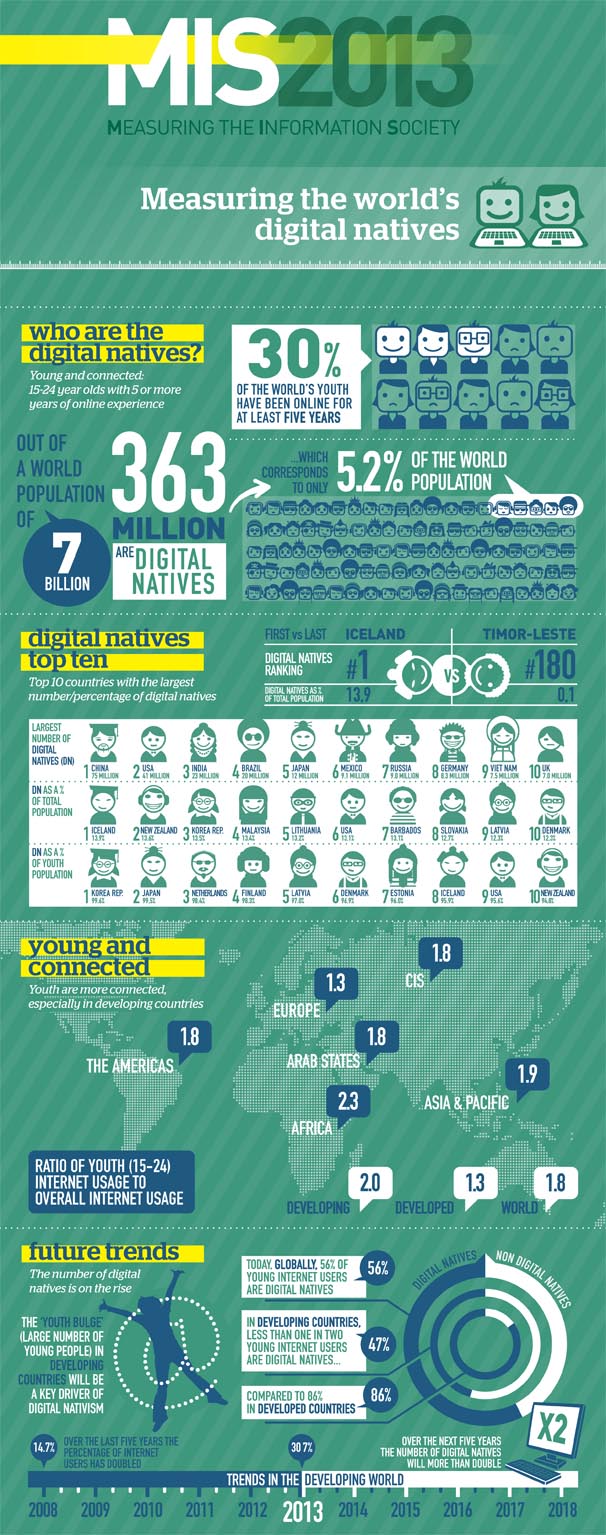Statistics: New Study Measures Digital Natives in Every Country
Note: The findings about digital natives are part of a larger report (Measuring the Information Society 2013) from the International Telecommunications Union with a variety of new stats re:information and communication technology (ICT) Links to the full text, exec summary, and infographics are below.
From Georgia Tech University:
According to a common myth, today’s young people are all glued to the Internet. But in fact, only 30 percent of the world’s youth population between the ages of 15 and 24 years old has been active online for at least five years. In South Korea, 99.6 percent of young people are active, the highest percentage in the world. The least? The Asian island of Timor Leste with less than 1 percent.
Those are among the many findings in a study from the Georgia Institute of Technology and International Telecommunication Union (ITU).
The study is the first attempt to measure, by country, the world’s “digital natives.” The term is typically used to categorize young people born around the time the personal computer was introduced and have spent their lives connected with technology.
Nearly 96 percent of American millennials are digital natives. That figure is behind Japan (99.5 percent) and several European countries, including Finland, Denmark and the Netherlands.
But the percentage that Georgia Tech Associate Professor Michael Best thinks is the most important is the number of digital natives as compared to a country’s total population.
“That’s because a country’s future will be defined by today’s young people and by technology,” said Best, who co-led the study and, jointly with ITU, developed the model that calculated the worldwide figures. “Countries with a high proportion of young people who are already online are positioned to define and lead the digital age of tomorrow.”
The countries with the highest proportion of digital natives among their population are mostly rich nations, which have high levels of overall Internet penetration. Iceland is at the top of the list with 13.9 percent. The United States is sixth (13.1 percent). A big surprise is Malaysia, a middle-income country with one of the highest proportions of digital natives (ranked 4th at 13.4 percent). Malaysia has a strong history of investing in educational technology.
The countries with the smallest estimated proportion of digital natives are Timor-Leste, Myanmar and Sierra Leone. The bottom 10 consists entirely of African or Asian nations, many of which are suffering from conflict and/or have very low Internet availability.
However, the report notes that Internet usage has increased significantly in the developing world during the past five years. The ITU believes the digital native population in these regions will more than double by 2017.
Overall, there are approximately 363 million digital natives out of a world population of nearly 7 billion (5.2 percent).
The findings about digital natives are part of a MUCH LARGER REPORT re: info tech.
- Measuring the Information Society 2013
Direct to Full Text (without Annex 4; 42 pages; PDF)
Direct to Executive Summary
Direct to Four Infographics
Additional Charts and Top Line Results
The new data, released in ITU’s flagship annual report Measuring the Information Society 2012, rank the Republic of Korea as the world’s most advanced ICT economy, followed by Sweden, Denmark, Iceland and Finland.
Of the ten top-ranked countries, eight are from Europe. The two remaining countries both come from the Asia-Pacific region, with the Republic of Korea in first place, and Japan ranked 8th. The top five countries have not changed their rank between 2010 and 2011. The only new entrant in the top ten is the UK, which moved up from 14th place last year to 9th place in 2012.
ITU’s ICT Development Index (IDI)* ranks 155 countries according to their level of ICT access, use and skills, and compares 2010 and 2011 scores. All countries in the IDI top 30 are high-income countries, underlining the strong link between income and ICT progress.
See Also: Global mobile penetration to match world population (via telecompaper)
Filed under: Data Files, News
About Gary Price
Gary Price (gprice@gmail.com) is a librarian, writer, consultant, and frequent conference speaker based in the Washington D.C. metro area. He earned his MLIS degree from Wayne State University in Detroit. Price has won several awards including the SLA Innovations in Technology Award and Alumnus of the Year from the Wayne St. University Library and Information Science Program. From 2006-2009 he was Director of Online Information Services at Ask.com.



